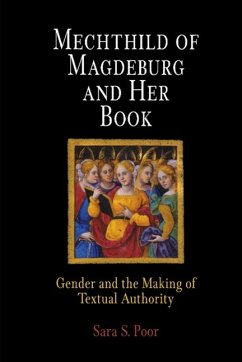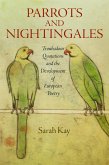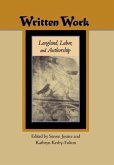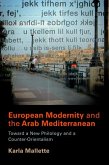Mechthild of Magdeburg and Her Book Gender and the Making of Textual Authority Sara S. Poor Winner of the 2006 First Book Prize of the Society for Medieval Feminist Scholarship Winner of the 2008 John Nicholas Brown Prize from the Medieval Academy of America "Authoritative, convincing, well argued."--Choice "Everyone who is genuinely interested in problems of women's writing, vernacularity, and the construction of textual authority will have much to learn from this book."--Barbara Newman, Northwestern University "Poor has not only contributed to our knowledge of Mechthild and the textual history of her work but provided an ambitious model for how to engage with a medieval text, its author, its reception by disparate readers, and its perception by modern scholars."--The Medieval Review Poor's astute examination of Mechthild's authorship and the historical transmission of her text contributes significantly not only to the fields of feminist medieval scholarship but also demonstrates how a medieval text can more broadly engage in the construction of religious, philosophical, and literary traditions across time."--Medieval Feminist Forum "This remarkable book, a kind of textual biography, is the product of meticulous research and is an astute reflection on the paradoxes of textual authority in mystical texts."--Journal of Religion Sometime around 1230, a young woman left her family and traveled to the German city of Magdeburg to devote herself to worship and religious contemplation. Rather than living in a community of holy women, she chose isolation, claiming that this life would bring her closer to God. Even in her lifetime, Mechthild of Magdeburg gained some renown for her extraordinary book of mystical revelations, The Flowing Light of the Godhead, the first such work in the German vernacular. Yet her writings dropped into obscurity after her death, many assume because of her gender. In Mechthild of Magdeburg and Her Book, Sara S. Poor seeks to explain this fate by considering Mechthild's own view of female authorship, the significance of her choice to write in the vernacular, and the continued, if submerged, presence of her writings in a variety of contexts from the thirteenth through the nineteenth century. Rather than explaining Mechthild's absence from literary canons, Poor's close examination of medieval and early modern religious literature and of contemporary scholarly writing reveals her subject's shifting importance in a number of differently defined traditions, high and low, Latin and vernacular, male- and female-centered. While gender is often a significant factor in this history, Poor demonstrates that it is rarely the only one. Her book thus corrects late twentieth-century arguments about women writers and canon reform that often rest on inadequate notions of exclusion. Mechthild of Magdeburg and Her Book offers new insights into medieval vernacular mysticism, late medieval women's roles in the production of culture, and the construction of modern literary traditions. Sara S. Poor teaches German at Princeton University and is coeditor of Women and Medieval Epic. The Middle Ages Series 2004 352 pages 6 x 9 ISBN 978-0-8122-3802-0 Cloth $69.95s £45.50 ISBN 978-0-8122-0328-8 Ebook $69.95s £45.50 World Rights Literature, Women's/Gender Studies
Hinweis: Dieser Artikel kann nur an eine deutsche Lieferadresse ausgeliefert werden.
Hinweis: Dieser Artikel kann nur an eine deutsche Lieferadresse ausgeliefert werden.








